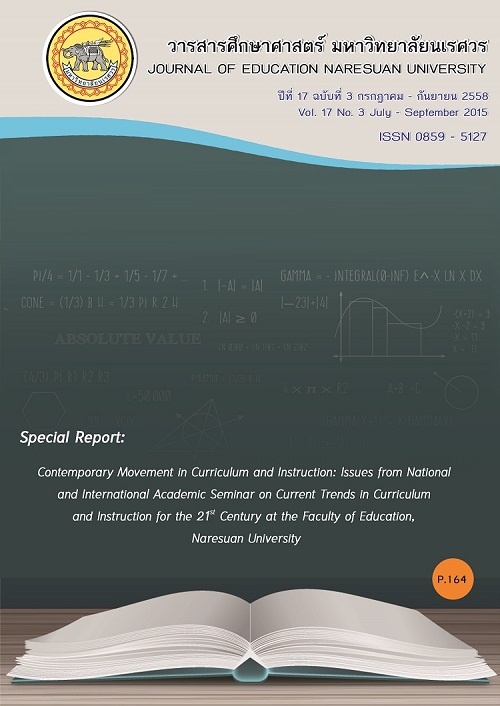รูปแบบการจัดการศึกษานอกระบบในสถานศึกษาขั้นพื้นฐานบนพื้นที่สูงและชายแดน สังกัดสำนักงานคณะกรรมการการศึกษาขั้นพื้นฐาน กระทรวงศึกษาธิการ
Main Article Content
Abstract
บทคัดย่อ
การวิจัยครั้งนี้มีจุดมุ่งหมายเพื่อพัฒนารูปแบบการจัดการศึกษานอกระบบในสถานศึกษาขั้นพื้นฐานบนพื้นที่สูงและชายแดน สังกัดสำนักงานคณะกรรมการการศึกษาขั้นพื้นฐาน กระทรวงศึกษาธิการ โดยมีวัตถุประสงค์เฉพาะ ได้แก่ 1) เพื่อศึกษาสภาพปัญหา ความต้องการและแนวทางการจัดการศึกษานอกระบบในสถานศึกษาขั้นพื้นฐานบนพื้นที่สูงและชายแดน 2) เพื่อสร้างรูปแบบการจัดการศึกษานอกระบบในสถานศึกษาขั้นพื้นฐานบนพื้นที่สูงและชายแดน และ 3) เพื่อประเมินรูปแบบการจัดการศึกษานอกระบบในสถานศึกษาขั้นพื้นฐานบนพื้นที่สูงและชายแดน วิธีดำเนินการวิจัยมี 3 ขั้นตอน ได้แก่ 1) การศึกษาสภาพปัญหา ความต้องการและแนวทางการจัดการศึกษานอกระบบฯ โดยประชุมระดมความคิดเห็นจากผู้บริหารสถานศึกษาขั้นพื้นฐานบนพื้นที่สูงและชายแดน จำนวน 15 คน และศึกษาแนวทางการจัดการศึกษานอกระบบในสถานศึกษาขั้นพื้นฐานบนพื้นที่สูงและชายแดน โดยสัมภาษณ์ผู้ทรงคุณวุฒิ จำนวน 3 คน และศึกษาสถานศึกษาที่มีวิธีการปฏิบัติที่ดี (Best Practices) จำนวน 3 แห่ง 2) การสร้างรูปแบบการจัดการศึกษานอกระบบในสถานศึกษาขั้นพื้นฐานบนพื้นที่สูงและชายแดน เป็นการยกร่างรูปแบบการจัดการศึกษานอกระบบฯ โดยผู้ทรงคุณวุฒิ จำนวน 3 คน และดำเนินการตรวจสอบร่างรูปแบบการจัดการศึกษานอกระบบฯ โดยผู้ทรงคุณวุฒิ จำนวน 9 คน 3) การประเมินรูปแบบการจัดการศึกษานอกระบบในสถานศึกษาขั้นพื้นฐานฯ โดยจัดประชุมรับฟังความคิดเห็น จากผู้บริหารและครูผู้สอนในสถานศึกษาขั้นพื้นฐานบนพื้นที่สูงและชายแดน รวมทั้งสิ้น 60 คน วิเคราะห์ข้อมูลโดยใช้ ค่าเฉลี่ย ส่วนเบี่ยงเบนมาตรฐาน และการวิเคราะห์เนื้อหา
ผลการวิจัย พบว่า
1. การศึกษาสภาพปัญหา ความต้องการ และแนวทางการจัดการศึกษานอกระบบในสถานศึกษาขั้นพื้นฐานบนพื้นที่สูงและชายแดน พบว่า สภาพปัญหาที่สำคัญ เช่น สถานศึกษาขั้นพื้นฐานบนพื้นที่สูงและชายแดนขาดเป้าหมายที่ชัดเจน ขาดการส่งเสริมและการมีส่วนร่วมของภาคส่วนอื่นๆ ผลการศึกษาความต้องการในการจัดการศึกษานอกระบบของสถานศึกษาขั้นพื้นฐานบนพื้นที่สูงและชายแดน พบว่า สถานศึกษาขั้นพื้นฐานบนพื้นที่สูงและชายแดน มีความต้องการกำหนดเป้าหมายรวมถึงแนวทางการดำเนินงานการจัดการศึกษานอกระบบอย่างชัดเจน
2. การสร้างรูปแบบการจัดการศึกษานอกระบบในสถานศึกษาขั้นพื้นฐานบนพื้นที่สูงและชายแดน ประกอบด้วย 4 องค์ประกอบ ได้แก่ องค์ประกอบที่ 1 ด้านปัจจัยนำเข้า องค์ประกอบที่ 2 ด้านกระบวนการ และองค์ประกอบที่ 3 ด้านผลผลิต และองค์ประกอบที่ 4 ด้านเงื่อนไขความสำเร็จ
3. ผลการประเมินรูปแบบการจัดการศึกษานอกระบบในสถานศึกษาขั้นพื้นฐานบนพื้นที่สูงและชายแดน พบว่า รูปแบบที่ใช้มีความเป็นประโยชน์และความถูกต้องครอบคลุมอยู่ในระดับมากที่สุด
คำสำคัญ : รูปแบบการจัดการศึกษานอกระบบ/ สถานศึกษาขั้นพื้นฐานบนพื้นที่สูงและชายแดน
Abstract
The main objective of this research was to develop a model for non-formal education management in schools on the rural highland and frontiers under the Office of Basic Education Commission. Three specific purposes were: 1) to study state of the problems, needs, and ways of non-formal education management in schools, 2) to construct a model for non-formal education management in schools, and 3) to evaluate the constructed model for its usefulness, practicality, and extensiveness. Research procedure comprised 3 steps: 1) studying state of the problems, needs, in schools through brain-storming for the opinions of 15 basic school administrators, and ways of non-formal education management through interviewing 3 experts, as well as studying 3 schools with best practice 2) constructing a model for the non-formal education management by drafting a tentative model with the consultation of three experts and validating it through group discussion of 9 experts 3) evaluating the constructed model through a public hearing from the discussion of 60 teachers and 9 administrators of schools on the rural Highland and frontiers.
Research results:
1. From the study, significant states of the problems emerged: the basic education schools still lack clear goals, promotions, and participations from other sectors. The study of needs in non-formal education management in the schools revealed that goal-setting and ways of the operations should be clear as well as encourage participation by other sectors. Ways of operations and supervisions should be clearly and systematically delineated.
2. The constructed model for non-formal education management in schools on the rural high land and frontiers consists of 4 components. Component 1-Input component. Component 2-Process component. Component 3-Output component. Component 4-Conditions for success component.
3. The evaluation of the constructed model yielded the result at the highest level of usefulness, accuracy and extensiveness.
Keywords: Non-formal Education Management/ Basic Education Schools on the Rural Highland and Frontiers
Article Details
The owner of the article does not copy or violate any of its copyright. If any copyright infringement occurs or prosecution, in any case, the Editorial Board is not involved in all the rights to the owner of the article to be performed.


